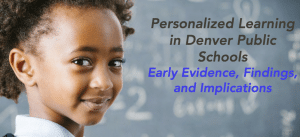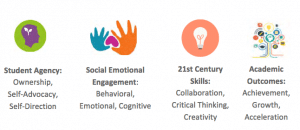Getting Results in Personalized Learning
CompetencyWorks Blog
 Denver Public Schools has released Personalized Learning: A Journey through Year One, one of the more interesting reports on personalized learning that I’ve seen. Although DPS’s efforts to introduce personalized learning into their schools has not required a competency-based structure, at least one of the three schools – Denver School of Innovation and Sustainable Design (page 13) – has important elements of competency education in place.
Denver Public Schools has released Personalized Learning: A Journey through Year One, one of the more interesting reports on personalized learning that I’ve seen. Although DPS’s efforts to introduce personalized learning into their schools has not required a competency-based structure, at least one of the three schools – Denver School of Innovation and Sustainable Design (page 13) – has important elements of competency education in place.
The first thing to know is that DPS defined personalized learning as “a holistic approach to learning, teaching and school design” to support “the unique needs of diverse students and develop students’ personal agency so that every student succeeds.” DPS focuses on four personalized learning outcomes: student agency, social emotional engagement, 21st century skills, and academic outcomes. It is important to note that they have placed student agency deeply in the core of their approach. It is equally important to note that they did not start with technology as the driver for personalization. They started with approaching children holistically as the driver.

The research (turn to page 52 of the pdf report, where you an find the early evidence, findings, and implications) is organized around two sets of questions: one on impact and one establishing baseline data on conditions for implementation including school climate, teacher beliefs, and correlations with student academic success. I am so impressed with the richness of the analysis shared in this report, as it opens doors for an inquiry-based approach to improving our schools.
Here are a few examples:
There were some positive impacts in academic outcomes. Student in PL classrooms outperformed their peers in traditional classrooms in science and math. In science, math, and ELA, students in PL classrooms outperformed district averages. Students who are ELL, FRL, SPED, and Hispanic all performed on par or better with comparison groups and also outperformed the district.
However, African-American students in PL classrooms underperformed their peers. Yes, it is discouraging that African-American students aren’t benefiting (yet) from PL. However, this is the type of accountability needed in districts that are embracing personalized learning (and competency education). Having lived in Denver myself and been part of efforts as a student to address unequal education through a court-mandated busing scheme to integrate schools, I know that Denver – like most/all cities – has a lot of work to do to build respectful, unbiased, productive educational strategies for its African-American students, parents, and communities. Responsibility for making the necessary changes starts with asking these questions and then engaging in deep research-based (qualitative and quantitative) inquiry to figure out what needs to happen to have 100 percent of students benefit.
In terms of the student variables of agency, emotional learning, and 21st century skills (collaboration, critical thinking, and creativity), the research focused on establishing baseline data. For example, their research indicated that white students have greater (self-reported) self-efficacy than other students. Thus, building self-efficacy skills should become an intentional strategy in PL schools. (It is, of course, important to remember that there is a difference between perception of self-efficacy and actually measuring the specific skills and mindsets that lead to efficacy.)
If I had been involved in this research question, I would have also asked two other sets of questions:
- Does using a competency-based structure with PL improve academic results, especially for the different sub-populations of students? (FYI – I’m going to find a different way of talking about students as sub-populations – it reinforces the idea that white, male, and higher income is the norm and everyone else is a sub-population.)
- If we looked at growth, not just academic outcomes, how would students compare? Would schools that take the time to actually build up the foundational skills rather than simply provide some type of scaffolding to allow access to grade level standards have greater overall growth? (This would need to be considered in the short-run over a year as well as longer-run over several years.)
Bravo to Denver and the three schools willing to take responsibility for researching important questions, share the findings publicly, and pursue mid-course corrections in personalized learning so that all students benefit.
See also: